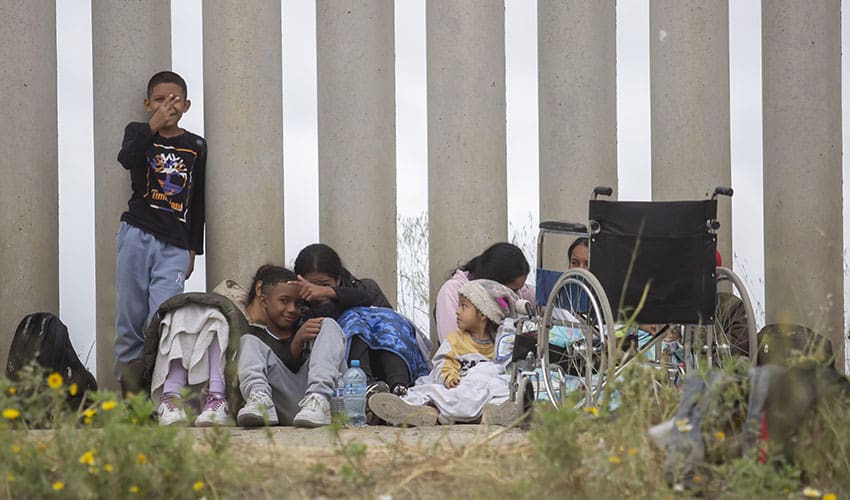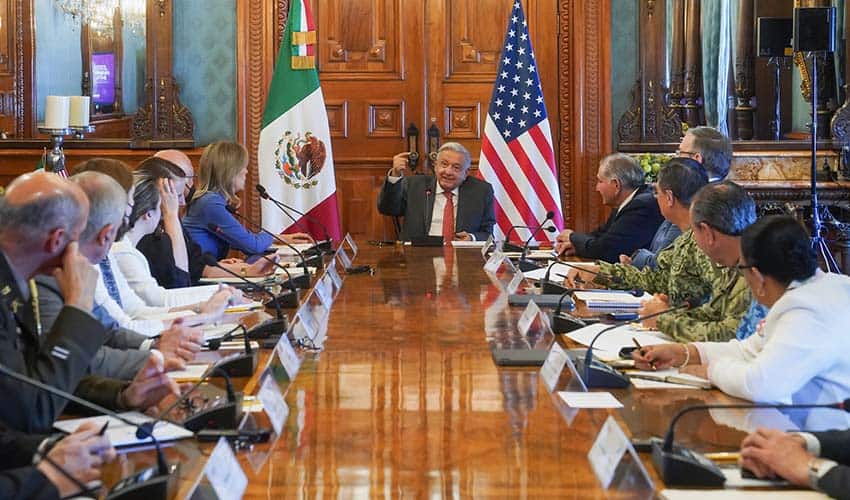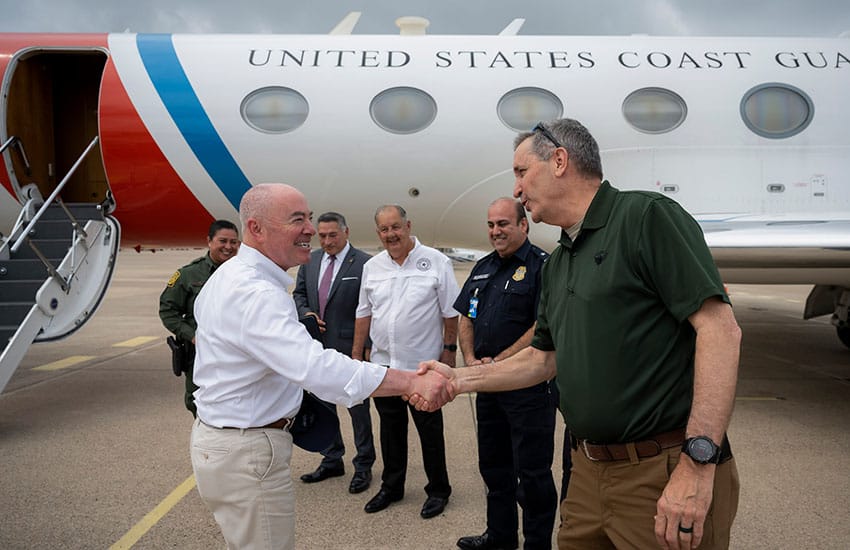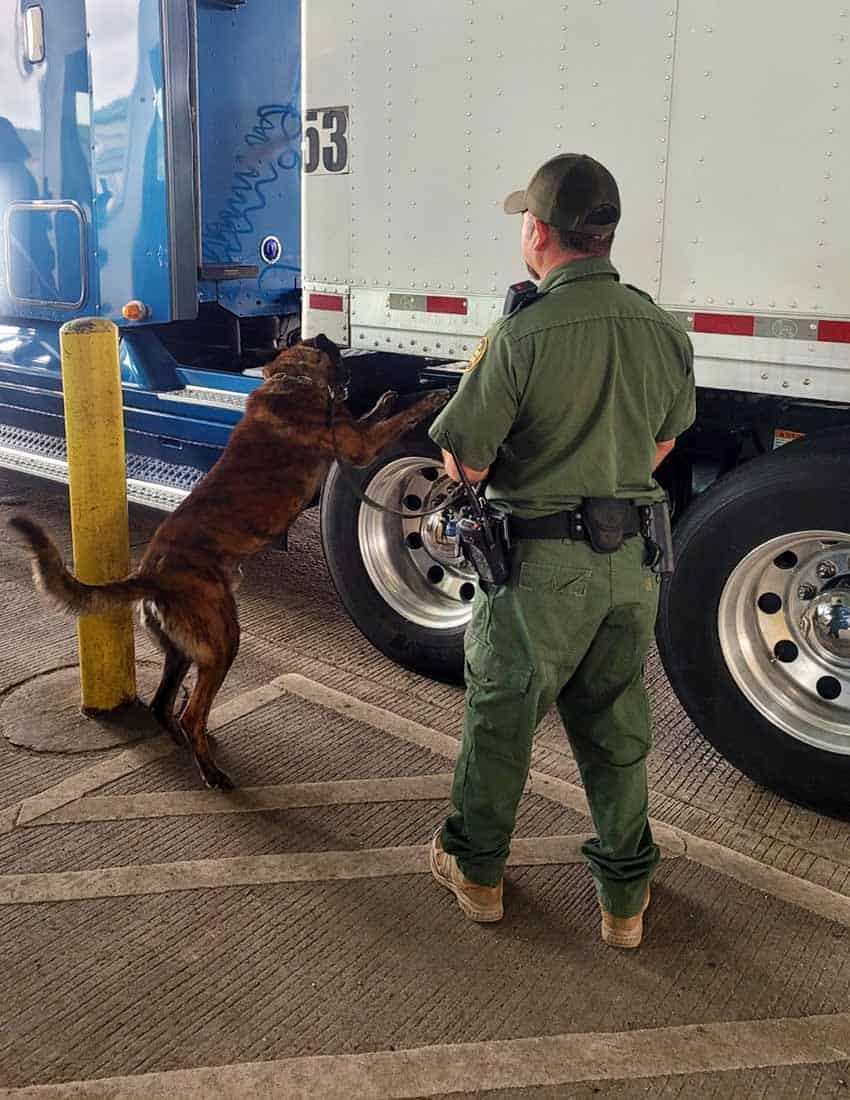AMLO, Biden share phone call as US Title 42’s end looms

The management of migration and bilateral cooperation to combat the illicit fentanyl and firearms trafficking were the focus of a discussion between President López Obrador and United States President Joe Biden on Tuesday.
López Obrador’s call with his United States counterpart came ahead of the termination on Thursday of the Title 42 policy, which for the past three years has allowed U.S. authorities to quickly expel asylum seekers, ostensibly to slow the spread of COVID-19.
The public health provision’s expiration is expected to lead to a surge in migrant arrivals at the Mexico-U.S. border, where large numbers of people are already waiting for an opportunity to claim asylum in the U.S.
López Obrador said on social media that he spoke with Biden for around an hour and that they reaffirmed their commitment to “continue working together on issues such as migration with a humanist dimension, the trafficking of drugs and weapons and, above all, cooperation for the well-being of the poorest people of our continent.”
“We’re good neighbors and friends,” he added above a photo that showed that Foreign Affairs Minister Marcelo Ebrard sat in on the call.
The president’s office said in a statement that López Obrador and Biden followed up on agreements reached as a result of the visit to Mexico earlier this month by Elizabeth Sherwood-Randall, the United States’ homeland security advisor.

“The presidents highlighted the importance of dealing with migration with a humanist approach and reiterated their commitment to continue expanding regular mobility pathways in the region so that migrants can request [U.S. work] permits from their places of origin and are not exposed to human trafficking,” the statement said.
The U.S. government said in late April that it would set up migrant processing centers in Colombia and Guatemala as part of efforts to reduce undocumented migration. It also announced a program in January that opens up new legal pathways to the U.S. for Venezuelans, Nicaraguans, Cubans and Haitians.
The White House said in a readout of the call between Biden and López Obrador that the leaders discussed “the importance of enhancing cooperation between the United States and Mexico to manage unprecedented migration in the region.”
“Toward that end, they discussed continued close coordination between border authorities and strong enforcement measures, in preparation for the return to full reliance on Title 8 immigration authorities at the U.S.-Mexico border, which carry steeper consequences for those removed than expulsion under Title 42,” the statement said.

“Both leaders underscored the value of managing migration in a humane and orderly fashion with expanded legal pathways and consequences for irregular migration.”
The readout also said that Biden and López Obrador “affirmed their shared commitment to address the root causes of migration from Central America and discussed expanding our two nations’ joint efforts.”
In addition, the leaders “discussed the urgency of effectively reducing crowding in northern Mexico” due to the large number of migrants there and “affirmed that after May 11, they will continue to implement the successful joint initiative which, over four months, achieved a 95-percent drop in border encounters of individuals from Cuba, Haiti, Nicaragua, and Venezuela at the U.S.-Mexico border.”
With regard to the hot-button issues of fentanyl and firearms trafficking, López Obrador and Biden reaffirmed their commitment to combating “this scourge that causes so much damage to both societies,” the Mexican president’s office said.

“They highlighted the formation of a presidential commission [in Mexico] to respond to the trafficking of arms and fentanyl, as well as the upcoming launch of a binational drug use prevention campaign,” the statement said.
Mexican and U.S. authorities have held countless meetings, including several recent ones, to discuss efforts to stem the northward flow of narcotics and the southward flow of weapons, many of which end up in the hands of violent drug cartels.
After a high-level bilateral security meeting in Washington D.C. last month, Foreign Minister Ebrard asserted that those efforts will soon yield “good results” and announced that the United States had agreed to establish a task force whose members will work at ports of entry between the two countries and aim to “substantially reduce” the smuggling of firearms into Mexico.
The White House statement said that “Biden committed to using all available tools to address arms trafficking and reduce the flow of firearms into Mexico,” and noted that both leaders “reaffirmed their commitment to modernize the shared border and promote inclusive economic growth.”

Mexico last year committed to invest US $1.5 billion on border infrastructure between 2022 and 2024, while the United States pledged expenditure of $3.4 billion on 26 projects at its northern and southern borders.
Earlier this year, the Ministry of National Defense awarded a US $612 million customs equipment contract to a United States company that will provide and install screening systems at 19 custom stations along Mexico’s northern border.
López Obador revealed last week that he had sent a letter to Biden to complain about the U.S. Agency for International Development (USAID)’s funding of groups that are “openly” opposed to the federal government, such as the organization Mexicans Against Corruption and Impunity.
However, there was no mention of that issue in the statement published by his office, nor in the readout of the presidents’ call posted to the White House website.
Mexico News Daily
Source: Mexico News Daily

